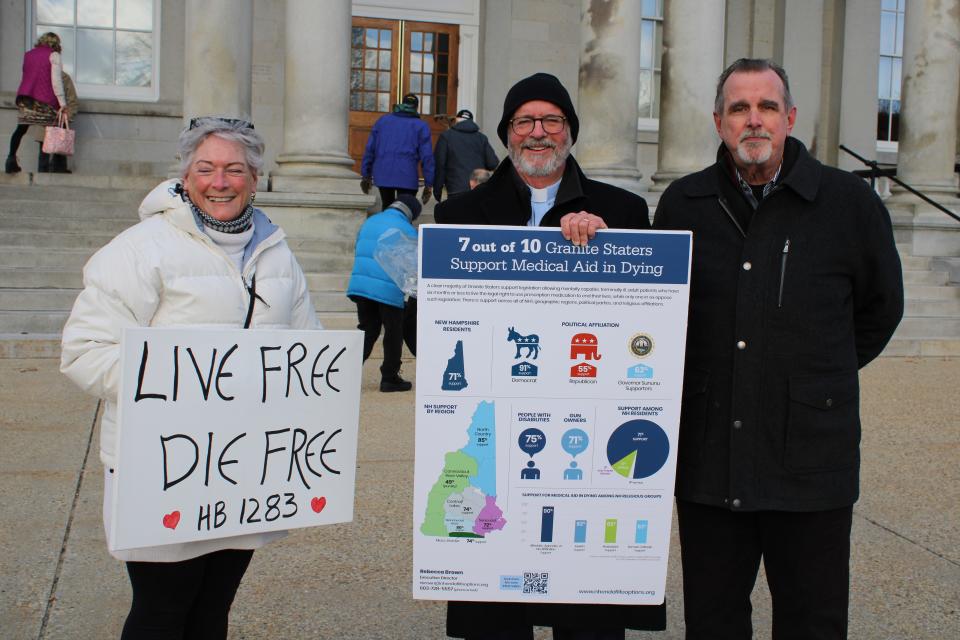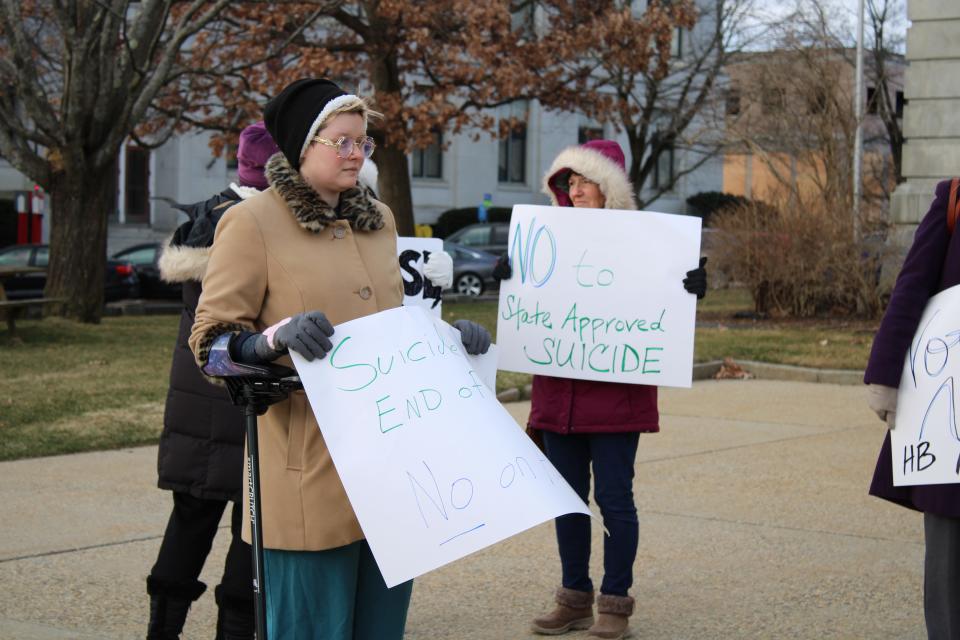NH House passes medical aid in dying: Debate isn't over yet
- Oops!Something went wrong.Please try again later.
CONCORD — The End of Life Options Act, which would allow terminally ill people in New Hampshire to access medical aid in dying, narrowly passed in the House of Representatives Thursday.
While versions of this bill have been brought to the legislature in past years, this is the first time it has passed the House. It comes after it gained its first victory in the House Judiciary Committee, where it was recommended to pass 13-7 for the first time.
In the House Thursday, it passed 179-176.

Rep. Marjorie Smith, D-Durham, is the prime sponsor of HB 1283, which is co-sponsored by both Democratic and Republican lawmakers.
“Those who choose MAID (medical aid in dying) are terminally ill and would much prefer to live, but, destined to die soon, would choose to die peacefully,” Smith wrote in the opinion in support of the bill. “This alternative is likely to be considered by very few, and acted on by even fewer. But it adds one alternative that, even just knowing it exists, can increase the quality of the end of life options addressing end of life matters.”
The bill will now head to the Senate. If it passes there, it will go to the governor’s desk. Gov. Chris Sununu has said he is open to considering the bill and it is not a partisan issue.
Voices for and against medical aid in dying
In her statement, Smith emphasized the bill is “very narrowly focused” and has been amended to improve areas the committee hearings identified. She also addressed concerns over whether the medical aid in dying could be used to discriminate against people with disabilities.
“While concerns have been raised by some members of the disability community, Disability Rights Oregon reported very few complaints, all of which focused on the concern that the Oregon Act might discriminate against persons with disabilities who would seek to make use of the Act but have disabilities that would prevent self-administration, thereby denying those persons to use the act,” she wrote.
In the dissenting opinion, Rep. Walter Stapleton, R-Claremont, wrote the bill is like a “step off the precipice.”
“This bill for medically-assisted suicide will have far-reaching harmful effects on our culture by messaging that ending one’s life in suicide for diagnosed terminal illness is acceptable, and thereby may be interpreted by vulnerable, infirm or elderly persons that perhaps there are other severe or justifiable health or quality of life issues that might be considered down the road for that “end-of-life option,” Stapleton wrote. “This is a dangerous door to creeping expansion and blurring the line to euthanasia, by normalizing or validating suicide.”
He also wrote that the bill is an affront to the belief that life is a gift from God as well as eroding trust in hospice and palliative care already offered, echoing comments he made in the committee vote.
Debate on the House floor lasted over an hour. Members of both parties spoke against and for the bill, and there were two early movements to table or kill the bill, which both failed.
Rep. Glenn Cordelli, R-Tuftonboro, shared his personal story with Adhesive Arachnoiditis in opposition to the bill. He said every day, he is in “excruciating pain.”
“I have no contemplation in my mind of wanting to die when I get up every day,” he said. But he said if this bill passes, he thinks insurance companies could cut back on his pain medications in favor of suicide. "Every time they offer that, because now I’m in more and more pain that I can’t stand it, how long will it be until they’ve basically left me no choice.”
Rep. Bob Lynn, R-Concord, shared statistics from the UNH Survey Center that said more than 70% of Granite Staters support this legislation, including a majority of gun owners, Catholics, and people with disabilities.
“I know that I’m in the autumn of life’s journey, and that in the perhaps not too distant future, I like all of you will have no choice to face death,” said Lynn, who is 74. “When that time comes and I am close to the end with no chance of survival, when hospice and palliative care are not enough, I think I should have the option of choosing not to needlessly suffer and you and all of our fellow citizens should have the right to make that same choice.”
Ultimately, the arguments in favor prevailed, and the bill was voted Ought to Pass, 179-176.
Proponents and opponents protest at the State House
On the cold and blustery morning, both opponents and proponents of the bill gathered outside the State House to make their side known before the bill was voted on later in the day.
Supporters of the bills carried signs with slogans like “Live Free Die Free.”
“There's too much suffering and for some people, it's very, very difficult. Everybody needs to have that option,” said Aylene Woznak, a registered nurse from Keene. “And a safe option, not wanting to be pushed into a corner where you have to look at suicide. This is not suicide. This is compassionate.”
Opponents of the bill carried signs saying “Don’t Normalize Suicide” and “Please No MAID." They voiced concerns that medical aid in dying would be a slippery slope.
Jules Good, a disability justice advocate from Newmarket who opposed the bill, said the No. 1 priority is making sure the bill doesn’t get all the way through the legislature.

“In other places where it's passed, we've seen the so-called safeguards that have been written into the bill be rolled back over time, which just opens the door to a lot of mismanagement and a lot of vulnerability for people who are already disadvantaged in the health-care system,” Good said.
Former state Rep. Ed Butler and the Rev. Peter Freidrichs, who were also outside the Statehouse supporting the bill, said it was successful this time because of an influx of people to their movement as well as a longer record in other states where medical aid in dying is legal, like neighboring Maine and Vermont.
“Our message is now we move on to the Senate and hope passage there and hopefully the governor will support it as well. It's not finished. It's a big step forward,” said Friedrichs. “But we have more work to do.”
This article originally appeared on Portsmouth Herald: NH House passes medical aid in dying as debate goes on

